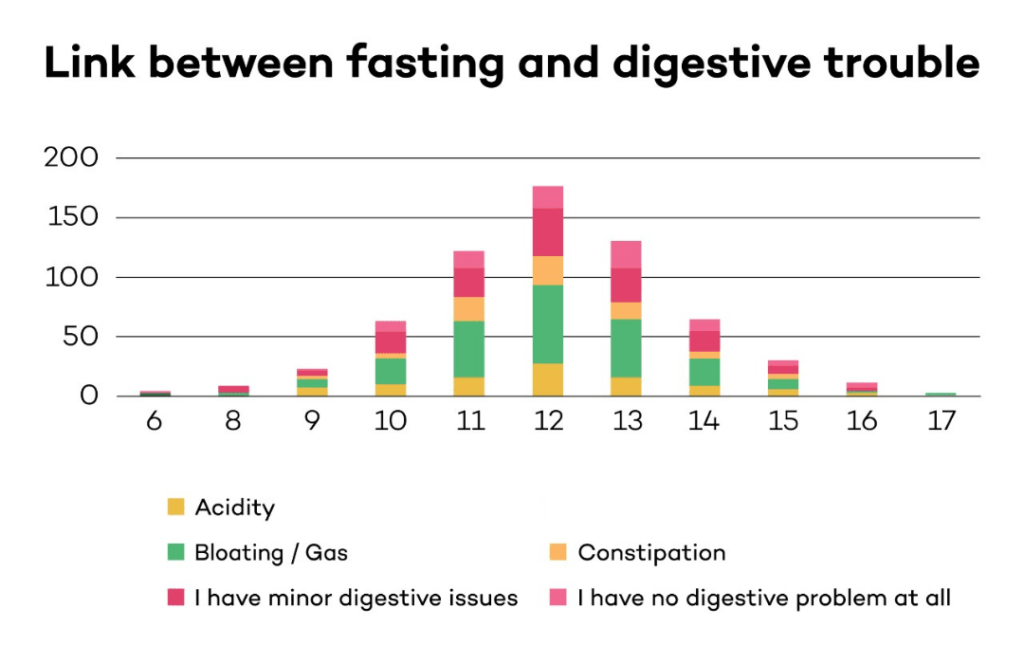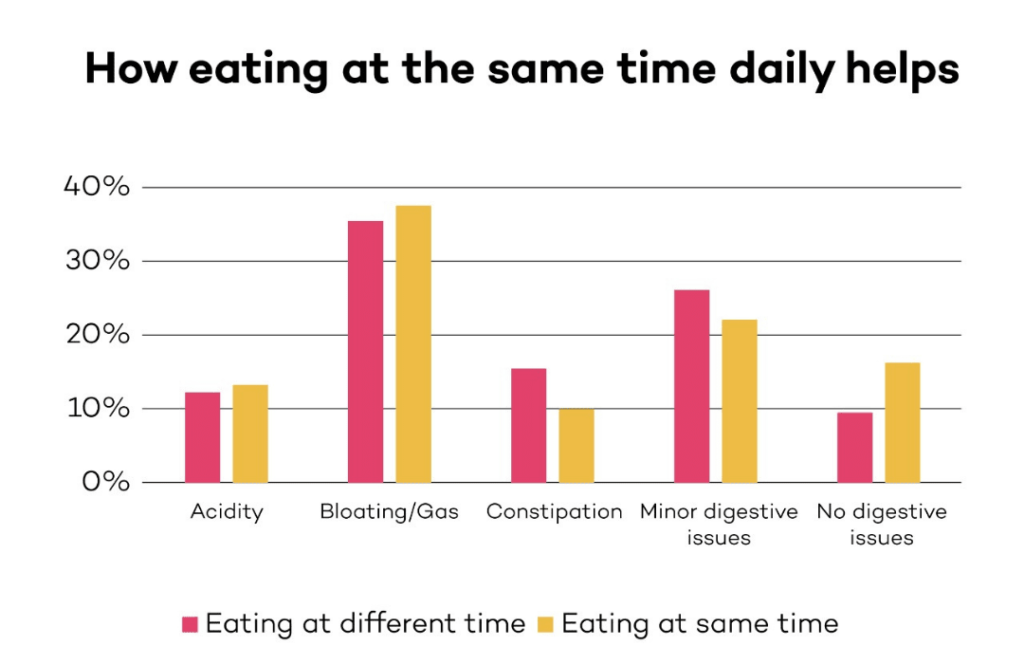We interviewed 647 Indians about their gut health. Here’s what we found.

What apart from diet affects gut health?
That is the question we wanted to answer.
Specifically, we wanted to understand how fasting, sleep and antibiotic usage affects gas, bloating and acidity.
Dirty
or Clean?
Free Analysis
Here is a summary of our key findings.
- Fasting is on the rise. The average Indian fasts nearly 12 hours a day, and nearly 1 out of 5 Indians fast more than 14 hours a day.
- Fasting does not seem to affect acidity, bloating, or constipation. Those who fast for up to 15 hours a day seem to have the same acidity, bloating, and constipation trouble as those fasting less than 12 hours.
- Dinnertime seems to be linked to acidity and bloating. Those who eat dinner after 7 PM seem to have a much higher chance of acidity and bloating.
- Eating at the same time daily may be beneficial for gut health, but only marginally.
- Antibiotics do not seem to make a large difference to improve gut health when it comes to digestive trouble, although antibiotic usage seems to provide some type of bloating relief.
- Sleep is clearly linked to digestive trouble, especially bloating. Nearly 40% of those sleeping for less than 6 hours a night suffer from bloating versus only 25% for those sleeping 8 hours or more.
Note: The majority of respondents are working professionals (between the ages of 30 and 50) from metros, and interviewed at the tail-end of the pandemic (Sept-Nov 2020).
How India Fasts
Nearly 30% of Indians eat breakfast after 10 AM…

…and a shocking 55% eat dinner after 9 PM.

How does this eating interval affect fasting?
The average Indian fasts for nearly 12 hours a day, and “intermittent fasting” seems to be on the rise.
Nearly 1 out of 5 Indians fast for 14 hours or more, daily.

Surprisingly enough, fasting does not seem to help with digestive trouble like gas, bloating or acidity.

People who fast for less than 12 hours suffer from acidity, gas and bloating to nearly the same extent as people who fast for 15 hours, daily.
This is a surprising and rather counter-intuitive finding.
Hundreds of studies have linked intermittent fasting to better insulin sensitivity, lower blood pressure, potential weight loss and improved gut health.
What about digestive trouble?
As this article from Harvard Health points out, there are two factors that directly affect how much fasting may help your body heal.
- When you eat AND
- What you eat
Eating in line with your body’s circadian rhythm (i.e. eating between sunrise and sunset), seems to offer some of the best results with fasting.
This segment of respondents (70+% who eat dinner after sunset) are eating outside their circadian rhythm.
Could this explain our findings with regards to fasting?
How dinner time affects acidity and bloating
There is a surprisingly strong correlation between the time you eat dinner and the chance you struggle with acidity.

The same pattern repeats for bloating, too.

How is dinner time linked to acidity / bloating, and why is there a drop off after 10PM?
We suspect it has something to do with sleep.
Anecdotal evidence suggests that most people who eat dinner between 9 and 10 PM usually go to sleep by 11 PM i.e. within an hour of eating dinner. Those who eat diner later than 10 PM, usually go to bed after 12 AM.
It is possible that the difference between dinner time and sleep time could be the trigger for acidity and bloating, versus just dinnertime alone.
We’ll need further research to understand this link better.
Eating at the same time, daily
…. doesn’t make much of a difference.

This is especially interesting for acidity, where irregular meal times are often listed as a trigger point for acid refluxes.
Till date, studies have established that eating at the time daily is linked to better cholesterol and insulin levels. Few studies have linked mealtime discipline to digestive trouble.
Could it be possible that mealtime discipline is a peripheral or tertiary factory that may help only when combined with proper nutrition, sleep and hydration?
The Impact of Antibiotics

A surprising 40% of respondents have taken at least one dose of antibiotics in the past 6 months.
The effect that antibiotics have on bloating is well documented.
Bloating is closely linked with SIBO (small intestinal bacterial overgrowth), and antibiotics are often prescribed to eliminate excess bacterial colonies.
For the ones who still suffer from bloating despite a course of antibiotics, the answer often lies in the other major trigger of bloating: FODMAP food or foods containing highly fermentable sugars.
Of all respondents who have reported no digestive trouble at all, nearly twice as many had not taken any antibiotics in the past 6 months.
The link between gut health and sleep
The data shows three clear insights.

First, length of sleep affects bloating. Nearly 40% of all respondents sleeping for less than 6 hours a night report bloating, versus just 25% for those sleeping for more than 8 hours a night.

Second, nearly 3x more people report no digestive trouble at all when they sleep for more than 8 hours compared to those sleeping 6 hours or less.

Third, and rather surprisingly, sleep has virtually no effect on acidity or constipation.
A concluding note
Back to our original question: what apart from diet improve gut health?
Fasting hasn’t shown a strong correlation, while dinnertime, length of sleep and antibiotics seem to have an influence on digestive trouble.
None of the correlations are as significant as we expected, or as theory seems to suggest. Could we be missing some factors, most notably stress and diet?
Perhaps the single largest insight from our results is working around your diet is inadequate when it comes to gut health. Food, water, and stress play an equally important roles. Probiotic Indian foods can also improve gut health.
Said differently: fasting long hours and sleeping well without correcting diet may not lead to good gut health.
More, coming soon!





It’s really informative and would love to explore more on this site.
Thankyou for the information.
It’s really informative and would love to explore more on this site.
Thankyou so much for the information.
Informative … gut health may also be affected by stress , genes , lifestyle (sedentary, moderate or heavy activity) , alcohol consumption and even smoking may affect it . Research is need to be done on each context so that we can find out the major causes.
very informative and intriguing